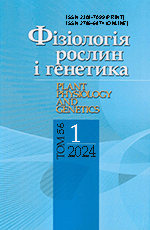Повний текст та додаткові матеріали
У вільному доступі: PDFЦитована література
1. Voytenko, L.V. & Kosakivska, I.V. (2016). Polyfunctional phytohormone abscisic acid. Visnyk Kharkiv. national. ahr. un-tu, 1, No. 37, pp. 27-41 [in Ukrainian].
2. Kosakivska, I.V. (2007). Ecological direction in plant physiology: achievements and prospects. Fiziologiya i biokhimiya kult. rastenii, 39, No. 4, pp. 279-290 [in Ukrainian].
3. Kosakivska, I.V., Vasyuk, V.A. & Voytenko, L.V. (2018). Effect of simulated soil drought on growth characteristics of related wheat species Triticum aestivum L. and Triticum spelta L. Fiziologiya i biokhimiya kult. rastenii, 50, No. 3, pp. 241-252 [in Ukrainian]. https://doi.org/10.15407/frg2018.03.241
4. Kosakivska, I.V., Vasyuk, V.A. & Voytenko, L.V. (2019). Effect of exogenous abscisic acid on seeds germination and morphometric parameters of seedlings of related wheat species Triticum aestivum L. and Triticum spelta L. Fiziol. rast. genet., 51, No. 1, pp. 55-66 [in Ukrainian]. https://doi.org/10.15407/frg2019.03.187
5. Kosakivska, I.V., Vasyuk, V.A. & Voytenko, L.V. (2019). Effect of exogenous abscisic acid on morphometric characteristics of winter wheat and spelt under hyperthermia. Fiziol. rast. genet., 51, No. 4, pp. 324-337 [in Ukrainian]. https://doi.org/10.15407/frg2019.04.324
6. Babenko, L.M., Hospodarenko, H.M., Rozhkov, R.V., Pariy, Ya.F., Pariy, M.F., Babenko, A.V. & Kosakivska, I.V. (2018). Triticum spelta L.: origin, biological characteristics and perspectives of use in breeding and agriculture. Regulatory Mechanisms in Biosystems, 8, No. 2, pp. 250-257. https://doi.org/10.15421/021837
7. Geiger, D., Maierhofer, T., Al-Rasheid, K.A., Scherzer, S., Mumm, P., Liese, A., Ache, P., Wellmann, C., Marten, I., Grill, E., Romeis, T. & Hedrich, R. (2011). Stomatal closure by fast abscisic acid signaling is mediated by the guard cell anion channel SLAH3 and the receptor RCAR1. Sci. Signal., 4, No. 173, ra32. https://doi.org/10.1126/scisignal.2001346
8. Hussain, S., Saleem, M.F., Iqbal, J., Ibrahim, M., Atta, S., Ahmed, T. & Rehmani, M.I.A. (2014). Exogenous application of abscisic acid may improve the growth and yield of sunflower hybrids under drought. Pakistan J. Agr. Sci., 51, No. 1, pp. 49-58.
9. Martin-St-Paul, N., Delzon, S. & Cochard, H. (2017). Plant resistance to drought depends on timely stomatal closure. Ecology Lett., 20, No. 11, pp. 1437-1447. https://doi.org/10.1111/ele.12851
10. McAdam, S.A., Brodribb, T.J. & Ross, J.J. (2016). Shoot-derived abscisic acid promotes root growth. Plant Cell Environ., 39, pp. 652-659. https://doi.org/10.1111/pce.12669
11. McAdam, S.A. & Brodribb, T.J. (2018). Mesophyll cells are the main site of abscisic acid biosynthesis in water-stressed leaves. Plant Physiol., 177, pp. 911-917. https://doi.org/10.1104/pp.17.01829
12. Muhei, S.H. (2018). Seed Priming with Phytohormones to Improve Germination Under Dormant and Abiotic Stress Conditions. Adv. Crop Sci. Tech., 6, No. 6, pp. 403-406. https://doi.org/10.4172/2329-8863.1000403
13. Phillips, K. & Ludidi, N. (2017). Drought and exogenous abscisic acid alter hydrogen peroxide accumulation and differentially regulate the expression of two maize RD22-like genes. Sci. Reports, 7, No. 8821, pp. 1-12. https://doi.org/10.1038/s41598-017-08976-x
14. Shumilina, J.S., Kuznetsova, A.V., Frolov, A.A. & Grishina, T.V. (2018). Drought as a form of abiotic stress and physiological markers of drought stress. J. Stress Physiol. and Biochem., 14, No. 4, pp. 5-15.
15. Takezawa, D., Komatsu, K. & Sakata, Y. (2011). ABA in bryophytes: how a universal growth regulator in life became a plant hormone? J. Plant Res., 124, pp. 437-453. https://doi.org/10.1007/s10265-011-0410-5
16. Zhu, J.-K. (2016). Abiotic Stress Signaling and Responses in Plants. Cell, 167, pp. 313-324. https://doi.org/10.1016/j.cell.2016.08.029
